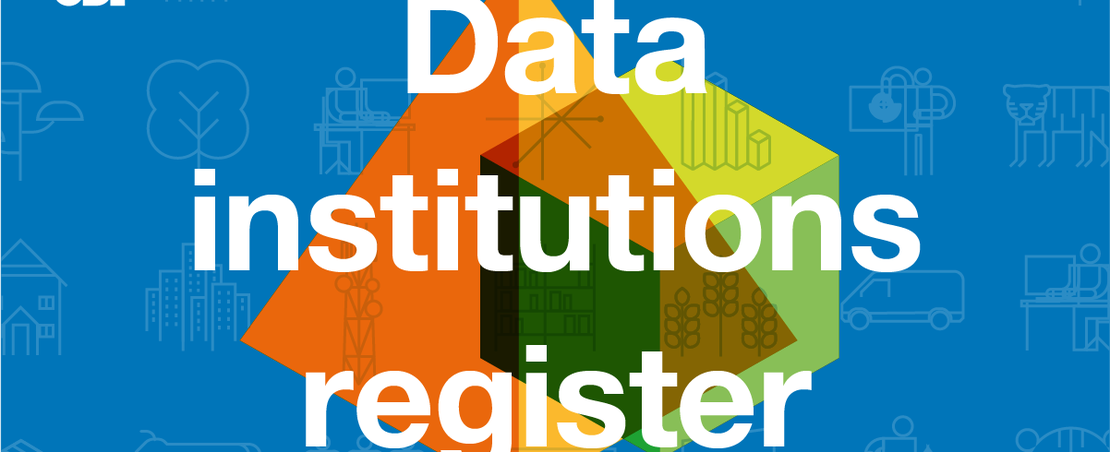
At the Open Data Institute (ODI), we’re exploring data institutions – organisations whose purpose involves stewarding data on behalf of others, often towards public, educational or charitable aims.
To support this ongoing work, we’re launching the Data Institutions Register, which is a curated, living repository of data institutions from around the world.
We intend for this register to become a systematic way to document data institutions as we come across them, which we can then use to sample data institutions for further analysis in our research projects, or to unearth interesting examples for talks and our other advocacy work.
In making the register openly accessible we also hope that others find it useful, such as:
- for existing data institutions or people trying to build new ones, as a useful source of information about data institutions from different parts of the world or sectors to be inspired by or to learn from.
- for policymakers, funders and others looking to create an enabling environment for data institutions, as an overview of what’s already out there and organisations to engage with.
- for researchers, think-tanks and others exploring the topic of responsible data stewardship, as a source of examples of organisations practicing this in the wild.
The register takes the form of an Airtable.
The Data Institutions Register is organised around six key roles we’ve identified that data institutions play. These roles help us to understand the different ways that data institutions steward data on behalf of their ecosystems.
Organising the register in this way helps us to avoid categorising data institutions using terms that continue to mean different things to different people, such as data trusts, data commons or data collaboratives. We’re aware that data institutions can play multiple roles, so we focus on the primary role that each plays. We also try to provide other important information about each organisation, such as its location, scope and size. Please check out our schema document for more information about why we chose those variables.
Right now, the Data Institutions Register is populated with data institutions that we’ve encountered so far in our research and other work. For example, it includes:
- public sector data institutions in the UK, such as the Office for National Statistics (ONS) and the Met Office
- data institutions we surveyed through our work with the World Bank to explore the role they play in low- and middle-income countries (LMICs)
- ‘bottom up’ data institutions, which are emerging to support people to play a more active role in stewarding data about themselves.
The initial set of 70 data institutions featured in the register are therefore skewed towards these types and geographies. Between now and the end of the year, we will be running targeted research campaigns to further populate the register. One of these campaigns will focus on data institutions in the supply chain/labour market domain, as part of our commitment to Humanity United, who have generously supported this work. Beyond this, we will also keep the register up-to-date with data institutions that we come across in other work and conversations.
In developing the register, we’re aware that the ODI is itself attempting to steward data. We’ll be looking to apply some of the approaches and best practices we’ve observed from data institutions themselves. Given that we want the data institutions register to be not only for the community but also shaped by it, we’re trying to put into practice the guidance the ODI has produced on collaborative data maintenance and stewardship.
We also recognise that stewarding data responsibly includes being open about its limitations. We encourage users to see it as a map of the complex terrain of data stewardship, governance and sharing – and as with any map, it will only ever be a flawed representation of reality. For example, the register does not contain all data institutions, and is skewed towards those we’ve come across in our work. The register should be viewed as a starting point for understanding and learning about data institutions. For more detailed explanations on the individual data institutions included in the register, you’ll need to continue through to their website (via the URLs provided). If you’re interested in other specific areas of data stewardship, governance and sharing beyond data institutions, other resources may be more suited to your needs (for example GovLab’s Data Collaboratives Explorer, or Mozilla’s Database of Initiatives | Alternative Data Governance in Practice).
Get involved
To contribute a data institution to the register, please fill out this suggestion form.
Once a suggestion has been submitted, we will review whether it fits within our definition of a data institution. The definition will always be a little ambiguous and subjective (as the concept of institutions is generally), so we will compare suggestions against three core principles: 1) the organisation stewards data, 2) this stewardship is central to the purpose of the organisation, and 3) this stewardship is on behalf of others and in pursuit of public, charitable or education aims.
We’re also keen to hear what you think of the register! Please let us know if we’re missing something important or you think we could do something to make the data institutions register an even more useful resource at [email protected].